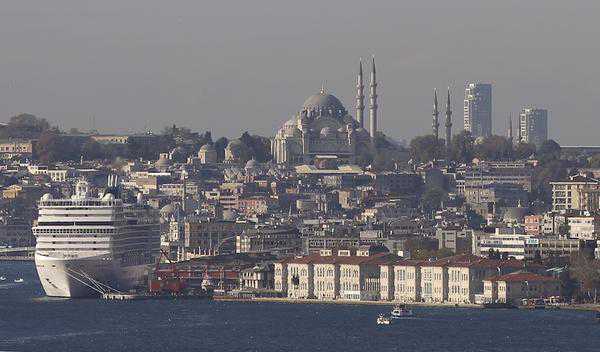In Turkey, it is not just the cost and questionable necessity of massive government development projects that are giving citizens pause. It is also what critics charge is the undemocratic way the city of Istanbul is being transformed without local input.
Among the ambitious projects initiated by Turkey’s governing Justice and Development Party (AKP), the building of a massive mosque in Istanbul with the world’s highest minarets, and the construction of another mosque and creation of a pedestrian area in the city’s central Taksim Square stand out. The roughly 50,000- square-meter mosque atop Istanbul’s Çamlıca Hill, one of the metropolis’ few undeveloped spaces, will be visible from around the city of 13.5 million. The Taksim Square project will eventually involve building a large mosque in Istanbul’s entertainment district, and then redirecting traffic underneath the square through underground tunnels.
Civil society activists in Istanbul aren’t necessarily opposed to the projects, but some are critical of what they say is the central government’s top-down approach, featuring close to no competition for public tenders, little transparency and few opportunities for public input.
“The government thinks that they have all the authority, which they surely have on political issues, but then they expand this into technical issues,” said Oğuz Öztuzcu, president of the Istanbul Independent Architects’ Association. “This is the key problem today.”
It is a problem that is infused with particular emotional energy, given its connection to one of the most pressing questions in Turkish society today – where to redraw the line separating mosque and state.
Critics of the Islamist-rooted AKP’s development projects disagree about whether the debate over Islam is really relevant to the Istanbul mosque debate. Cengiz Aktar, a political science professor at Istanbul’s Galatasaray University, asserts that the question is not about the role of Islam in Turkey, but of democracy. “Turkey is an Islamic country already. It is not a matter of becoming [more] Islamic,” Aktar said.
Some believe that Turkey’s powerful Prime Minister Recep Tayyip Erdoğan, a devout Muslim, ordered the construction of the Çamlıca mosque as a monument to his own legacy, as well as to “his party and Islam.” Plans to build it with public funds have furthered such accusations.
In announcing the Çamlıca project this May, Erdoğan did not delve into justifications, but described the initiative as a heritage revival that would also include workshops for traditional artisans and the reconstruction of madrasas, or Islamic learning centers.
“There is no consultation with stakeholders, users, or dwellers in the town,” complained Öztuzcu. “[The projects were] invented by a few individuals.”
Despite the eyebrow-raising complexity of these publicly funded projects, no official cost estimates exist for the Çamlıca mosque, the Taksim mosque or the Taksim Square pedestrian area. While all three projects will involve the destruction of relatively rare green areas, no public discussions to address related concerns have been held.
While few Turks may be “rejoicing” over the projects, noted Aktar, “people are dealing with their own daily struggle to survive,” and are not strongly inclined to protest over issues such as these.
For the planned mosque in Taksim, officials claim that people in the surrounding area need more space in which to pray – an assertion fueled by the perceived Islamic revival in the country. Istanbul, according to government estimates, contains 3,028 mosques.
A court ruling this summer overrode attempts to stop the Taksim-Square mosque’s construction.
Requests by EurasiaNet.org for comment about the projects from the Istanbul municipality were not returned. A spokesperson for the Ministry of Environment and Urbanization, which oversees urban development projects, was unable to comment, and had not heard of Hacı Mehmet Güner, the Çamlıca mosque’s architect.
For the governing AKP, now a decade in power, state spending on large-scale projects could have important economic ramifications. The construction sector comprised about 10 percent of the economy in 2011, according to TurkStat, the government statistics agency. Last year, Turkey’s economy grew by a stellar 8.5 percent, with the construction sector expanding by about 11 percent. Faced with a projected slow-down in economic growth, the government has a strong incentive not to rock the boat at this point.
Editor’s note:
Justin Vela is a freelance reporter based in Istanbul.
via Turkey: Istanbul Mosque Debate about Democracy or Islam? | EurasiaNet.org.
